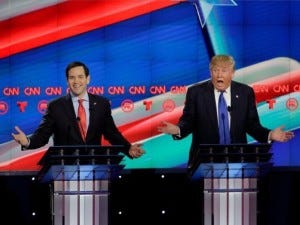It took a long time, but Donald Trump's GOP primary competitors finally figured out that battling for second place was an ineffective campaign strategy. With all but one of the early states going to Trump, and national polls showing more to soon follow, Marco Rubio and Ted Cruz understood that they needed to focus their efforts on chopping away at the big dog.
They showed up at last night's CNN debate wielding axes.
Viewers who tuned in to hear about policy and fresh ideas were likely disappointed, but the reality is that the rise of Trump has proven that a significant portion of the base just doesn't care about such things anymore. They want attitude. They want soundbites. They want a fight. They got all of those things, but for the first time, it wasn't Donald Trump who walked out as the victor of such a contest. He was the decisive loser. And though Cruz did well and helped himself, it was Rubio who came out as the clear champion.
Rubio bested Trump in their head-to-head exchange of personal insults and one-liners. He made Trump look weak, portraying the billionaire's success as having been inherited rather than earned. He mocked Trump as a lightweight for his faux conservatism and his robotic repetitiveness (a criticism Rubio himself had to deal with a few weeks back). He effectively branded Trump as a hypocrite for his bulk-hiring of illegal immigrants. While Cruz attacked Trump for not divulging has tax returns, Rubio ridiculed Trump's business failures and his inclination to liken the Middle East to a real estate venture.
Perhaps most importantly, Rubio drew attention to some of Trump's controversies (like Trump University ) that, up until today, had largely been overlooked by a media.
This is significant because the media hasn't been vetting Trump to the level they would typically vet a GOP presidential front-runner. Sure, journalists have been reacting to Trump's controversial, often dishonest rhetoric, but there hasn't been a serious effort to shed light on questionable business practices, lawsuits, associations, etc. (like there was with Mitt Romney). Now, with Rubio publicizing such topics in a high-profile, national debate, the media's going to have to react.
For Trump, the optics of the two-way assault were bad. He looked rattled. He flailed. He turned "low-energy" (as Trump likes to put it) fairly quickly, and he never quite recovered. He wasn't funny like he usually is, and he never landed any significant counter-punches.
As disheartening as it is that style and optics have become the most important elements in a run for the presidency, it was Trump who set these schoolyard ground rules. And last night, the bully got knocked to the ground.
As of this morning, Rubio hasn't let up. He's been mocking Trump on the campaign trail using the kind of attack-lines we'd previously only seen from Trump himself. He's been deriding Trump's tweets, proclaiming Trump had a meltdown backstage. Rubio even went as far as suggesting that Trump may have wet his pants at the debate. He's framing Trump as small and inconsequential, and he's doing it in front of roaring crowds. It's an all-around optics win.
Is any of this conduct dignified? No. Is it presidential? Absolutely not. But it's an effective attack strategy against a man who has skated to front-runner status on little more than his crass, loud slogans, and a larger than life persona.
The big question is this: Has it come too late? Conventional wisdom says yes (and I'm inclined to agree), but if we've learned anything from this campaign, it's that conventional wisdom no longer applies.
If Rubio wants to win the primary, he'd better continue his roast of the front-runner. And it needs to be relentless.



